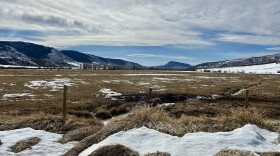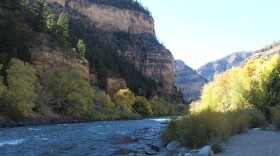-
The Fetcher ranch in northwest Colorado is on the frontlines this year of record-low snowpack across the West. It's adding a sense of urgency among seven states to finalize a plan for how to conserve the dwindling Colorado River.
-
The Colorado River District has cleared an important hurdle in securing the Shoshone water right, which is an in-stream flow agreement with the state. The deal is designed in part to protect Colorado River water levels, and it was approved despite objections from utility companies on the Front Range.
-
The federal government set a deadline of November 11 for states to have a framework for allocating Colorado River water post-2026. The states missed that deadline, and have failed to produce an agreement.
-
The seven states that use the Colorado River have until November 11th to present a basic plan to the federal government for how to allocate water in the river. But negotiations have been contentious, and spectators aren't sure whether there will be consensus.
-
Utah’s Supreme Court has upheld a ruling rejecting a proposal to pipe 55,000 acre-feet of Green River water from Utah to Colorado’s Front Range. The long-debated project, led by Fort Collins developer Aaron Million and Water Horse Resources, would have sent water more than 300 miles across Wyoming. The court agreed with the state engineer’s finding that Water Horse must prove the water would be beneficially used in Colorado before any export can be approved. Conservation groups are calling the decision a major victory for the Colorado River, while Million says the project isn’t over yet.
-
The move, by the Colorado River Indian Tribes in Arizona and California would give rights of nature to the water, marking a historic first.
-
Colorado River states appear to be coalescing around the early makings of a new plan to share water in a way that accounts for climate change.
-
States that use the Colorado River say they don't want to go to the Supreme Court, but some are quietly preparing for litigation.
-
Environmental groups that work to protect the Black Mesa region in northeast Arizona say that Peabody Energy has not done a sufficient job of reclaiming the now-defunct Kayenta coal mine, and shouldn’t be refunded millions of dollars in bond money. Recently, the coal company Peabody Energy applied for the release of $17.3 million, part of a larger bond held by the Office of Surface Mining, or the OSM, for parts of the Kayenta Mine that have undergone some phases of reclamation. The office is under the Department of the Interior, and is tasked with ensuring coal mines adequately restore land damaged during strip mining. The bonds were posted with the OSM by Peabody to be returned only after the mine lands had been reclaimed to certain standards. In late August, the OSM held a public meeting on the bond release at the Navajo chapter house in Forest Lake where some community members also raised concerns about the long-term impact of mining on local water resources.
-
The System Conservation Pilot Program was recently rebooted with $125 million in funding from the Inflation Reduction Act to fight shrinking water levels in Lake Powell.

Play Live Radio
Next Up:
0:00
0:00
Available On Air Stations









